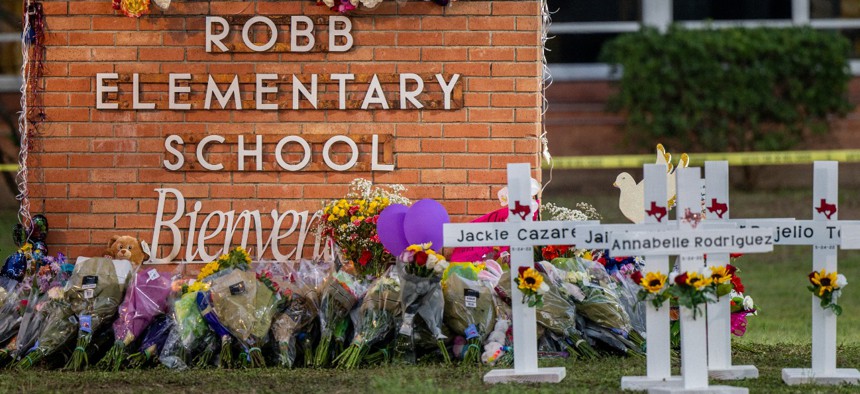
It is common for the Border Patrol to help local law enforcement authorities in towns such as Uvalde, Texas, which is only a few miles from the U.S.-Mexico border. Brandon Bell/Getty Images
Why Federal Agents Were the First on the Scene to Kill the School Shooter in Texas
Current and former officials explain why it is common for DHS personnel to respond in some local emergencies.
When a gunman who had murdered 21 people, including 19 children, at an elementary school in Uvalde, Texas was shot and killed, it was not local police but federal officers who put an end to the carnage. Their involvement was not unusual, according to former and current federal law enforcement officials familiar with crisis operations, as Border Patrol agents often deploy to emergencies in towns such as Uvalde that are only a few miles from the U.S.-Mexico border.
Under federal regulations, Customs and Border Protection, Border Patrol’s parent agency, can operate within 100 miles of the border without special permission. As the largest law enforcement agency in the country with its 60,000 employees, it can often offer resources that local entities cannot or are too overwhelmed to provide themselves.
CBP maintains a station in Uvalde, responsible for 3,000 square miles in the area. It has a permanent checkpoint in the town for automotive traffic, and also assists with train and freight operations. A tactical team known as BORTAC was the first to arrive on the scene from CBP and, while the final details are still hazy, appeared to kill the shooter. One agent from that team was wounded as a bullet grazed his head and another struck his leg, but he has since been released from the hospital.
“They have the authority under federal law to protect those communities, and that's exactly what happened,” said Larry Cosme, a former long-time officer at Immigration and Customs Enforcement and current president of the Federal Law Enforcement Officers Association.
Cosme said the Border Patrol agents have access to the same radio frequencies and any officer who hears the type of distress call that occurred on Tuesday would have the instinct to respond to it.
“It's very common in those areas where the Border Patrol has a big presence,” Cosme said. “They supplement these smaller departments.”
A Border Patrol official briefed on the situation said the BORTAC team is similar to a SWAT team, trained specifically for situations with active shooting like the one that took place in Uvalde. In this case, the agents responded to a general call for law enforcement. In other situations, local law enforcement will specifically contact Border Patrol and ask for their assistance.
“If you look at most areas where we work, generally speaking it’s smaller police departments,” the official said, adding in areas such as Uvalde Border Patrol “is the largest law enforcement presence.”
Local law enforcement, therefore, regularly requests the Border Patrol’s assistance.
Following the incident, the Homeland Security Department stressed that CBP would not partake in its usual immigration enforcement activities at the site and would provide emergency assistance to individuals "regardless of their immigration status."
“The site of the tragedy in Uvalde, Texas is a protected area,” DHS said. “To the fullest extent possible, ICE and CBP will not conduct immigration enforcement activities there so that individuals, regardless of immigration status, can seek assistance, reunify with family and loved ones, and otherwise address the tragedy that occurred.”
DHS Secretary Alejandro Mayorkas said the Border Patrol agents immediately and courageously responded to the scene. Dozens of other agency personnel quickly arrived at the scene, some of whom had children of their own in the school.
“Without hesitation, they put themselves between the shooter and students to end the bloodshed and administer medical aid,” Mayorkas said. “Without question, their heroism yesterday saved lives.”
The Border Patrol official said what those agents should be most commended and remembered for is not neutralizing the suspect, but for their actions in trying to administer emergency medical aid to the wounded children and other victims.
“The heroics is not taking down the shooter,” the official said. “The heroics is trying to save life.”
Cosme also expressed his gratitude for the agents’ quick actions.
“I thank God that they were on the scene, assisting the state and local officers to stop the carnage and to save and rescue other children that were potentially in harm's way,” Cosme said.
Ross Gianfortune contributed to this report.







